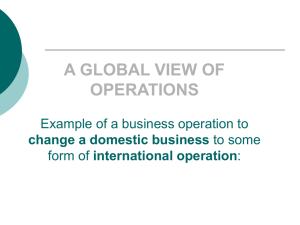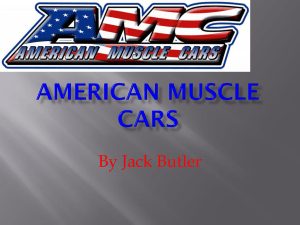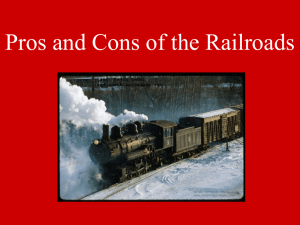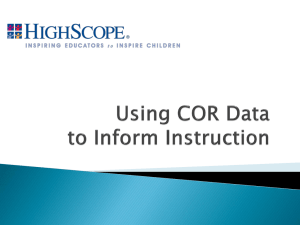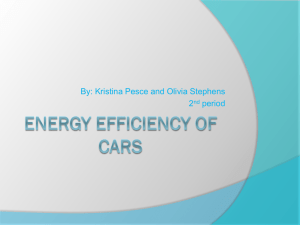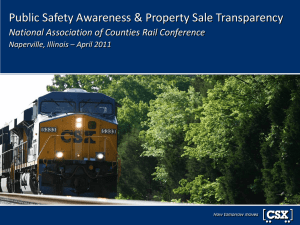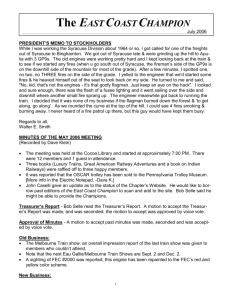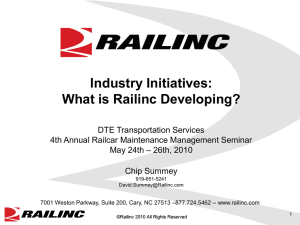Car Ownership
advertisement
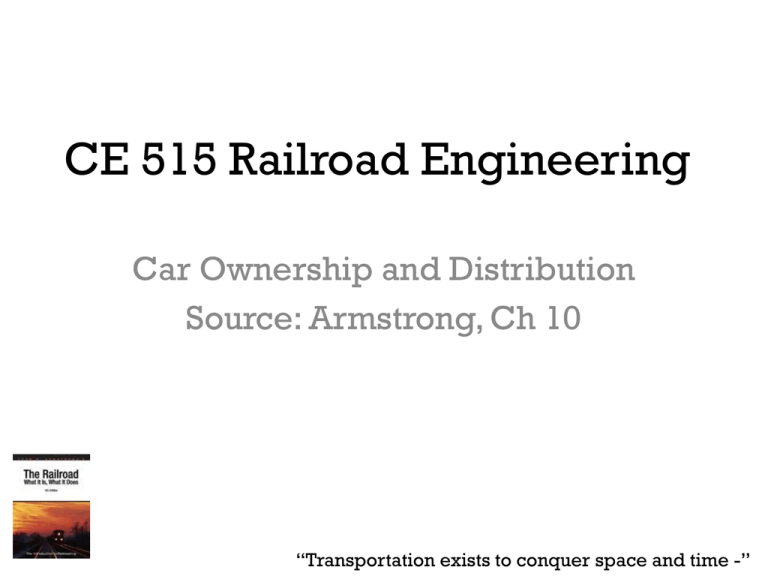
CE 515 Railroad Engineering Car Ownership and Distribution Source: Armstrong, Ch 10 “Transportation exists to conquer space and time -” Railroad Car Ownership? • Balance – Too few = potential loss of business – Too many = more expenses • Car ownership/upkeep is 15% of expenses Originating & Terminating Carriers • Originating carrier – Produce more products than consume – Usually short of cars • Causes need to lease them • Terminating Carriers – Consume more than produce – Have many “emptys” http://redlightnaps.files.wordpress.com/2007/08/thomas.jpg Private Car Ownership • Railroads encourage utilities to own their own cars – In exchange, get reduced freight rates – Example: power plant having their own coal cars • Reduces railroads’ new car investments and maintenance costs • Initials end in “X” Car Rental Systems • Bilateral Agreements – Use of another railroad’s cars – Terms and rate are private – Rail Inc (subsidy of AAR) keeps track of all “interchanges” and tracks balances • Per Diem – Actually per hour – How bilateral agreements are charged https://www.railinc.com/rportal/web/guest/home Rates • Need to be high enough to have return to owner • Low enough to encourage the railroad to keep it long enough to find a return load – Will improve overall car use • Used to be regulated by ICC http://www.nuwireinvestor.com/blogs/investorcentric/uploaded_images/dollar-bill-question-mark-734386.jpg Rates • Equipment Assets Management Working Committee – Recommend rates – Members represent all rail carriers • Rates established using formula involving original cost and age of car – Examples: • Elderly 50’ plain boxcar: $0.18/hr + $0.054/mile • Newer multilevel 89’ flatcar: $1.75/hr + $0.12/mile Service and Distribution Rules • Objectives 1. Ensure well-timed movement of empties 2. Reduce empty car mileage • Example: – Empties can now take detours to be loaded instead of being always being sent directly back “home” Assigned Service Cars • Cover specific products between specific shippers & consignees • Car ownership is often shared by different RR’s • Cars almost always return empty http://i.ytimg.com/vi/qH8XMxwphWA/0.jpg Leasing Industry Leaders • For the most part is comprises of small/medium sized firms – Specialize in one or two types of cars http://rscat.com/index.php?gr_1_id=19&gr_2_id=7&gr _3_id=0&doc_id=4&start=all&all_news_In_Chanell=1& details=1 • Also large companies – General Electric Railcar Services Corp. • Largest fleet in the industry – TTX – GATX Financial Corp http://tankcarhomepage.railfan.net/photos2/gatx6105.jpg Railbox & Railgon • TTX Corp. http://en.wikipedia.org/wiki/File:Boxcar_railbox.jpg – Owned by major railroads – Own standardized plain cars for use by railroads – lower rates • Railbox (RBOX) : plain box cars • Railgon (GONX) : plain gondolas Railgon picture http://1stclass.mylargescale.com/NTCGRR/railgon8.JPG https://www.railinc.com/rportal/web/guest/umleremis • Universal Machine Language Equipment Register • Date file updated daily • Shows availability for all cars • Maintained by Rail Inc • TRAIN II – Telerail Automated Information Network – Keeps location of every freight car – Covers all railroad interchanges in the US and Canada • SAM – Shipper Assist Message – Lets shippers receive data from cars carrying their shipments Car Route Optimization • AAR continuously does studies to improve car use strategies • Database the waybills of 1% of all trains – Over 200,00 per year • Generate computer programs to evaluate the effect of car service http://4rail.net/4rmedia/nam/usa_gatx_ca_bakersfield_tankcarLPG_gatx57162__2008_XL.jpg Sources •http://www.highbeam.com/doc/1G1-113855705.html •Armstrong, The Railroad: What It IS, What It Does •http://www.answers.com/topic/rental-of-railroad-cars
